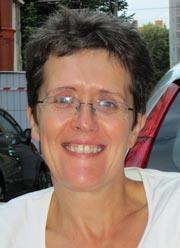There are excellent teachers who achieve great results. Let's share this expertise, build a world class chemistry team and coach for the best
Endpoint: Vanessa Kind has the last word

I have Olympicitis. I am waving a flag and screaming at the TV, tears running down my cheeks, mesmerised by world record breaking cyclists riding in close formation at 60 km hr -1, legs spinning in unison like magnificent machines; transfixed by rowers flexing their biceps to pull oars 35 times per minute to send a boat down a lake faster than any beefy Aussie. I watch late, revelling in fantastic results achieved by people I have never heard of in sports I know nothing about. These medal winners are firmly on the ladder of success. I envy them. I've only ever made it to the trampoline - bouncing up and down. What makes them succeed?
Programmes for success
Cycling and rowing are among GB's most successful sports in recent Olympics. Let's unpick how they've done it. First, talent is found. The British Rowing website sets out explicit expectations for Olympic gold: teenage rowers selected by physical attributes, including height (minimum 178 cm for girls and 182 cm boys), strength and the endurance to withstand a 6 minute race. In cycling, a national Go Ride programme encourages clubs to spot young talent for promotion to the British Team's Olympic Programme, presumably identifying very fast riders with excellent balance. Next, the talent needs coaching. Apparently, GB's current chief rowing coach creates a 'long, fluid, relaxed style' in our 'boats' (technical term) for the duration of each race, not tightening or shortening the stroke in the closing stages as tension builds. Cycling coaches focus on precision, accuracy, and, quite simply, 'how we can beat the opposition'. Britain's best 18-23 year old cyclists join a Manchester-based 'university of cycling', enabling them to train and compete at the highest level without distractions.
High quality coaching seems key to the teams' achievements. Without good coaches, even the most talented athletes achieve little. Someone needs to tell them how to improve, weeding out weaknesses in performance, promoting focus on achievable goals, aiding in handling difficulties. Famously, Sebastian Coe was coached by his dad, Peter, who got into the role by realising that his athletically talented son was being told nonsense. He went on to write a definitive guide to coaching middle distance runners. His son was developed and inspired to beat the opposition and, eventually to run our Olympics.
Quality coaching
Coincidentally, the RSC's Chemistry Education Research Group (CERG) is initiating a project, Describing Practice in Chemistry Teaching, (DePiCT) we hope will result in a high quality guide to chemistry teaching. Emulating Peter Coe, I have heard a lot of nonsense in laboratories. For example, atoms 'hold hands' as they form bonds and 'swap partners' on reacting; and a reaction is 'mixing' chemicals, 'like mixing paint' or 'baking a cake' (close, but not worth even a bronze). To coach successful chemists, this sort of rubbish needs to stop. We need consistently excellent chemistry teachers. Given that around 55% of incoming science teachers have biology backgrounds, they need support to teach our subject well. We must imitate the precision and technical expertise of our best sporting coaches, by making available activities to motivate, develop, and inform students' understandings of chemistry concepts, eliminate misconceptions, driving them to achieve well in exams and be enthused about the subject. The aim is to capture the best, make it available and inspire the next generation of chemistry teachers.
Winning performance
I need to mention one of my trampoline moments, an 'up'-bounce, the closest I have ever come to a gold medal for chemistry teaching. During my doctorate degree I studied how students' understandings of chemistry concepts change during an A-level course. I found out about specific misconceptions they held, and talked with teachers about how to handle these. I decided to put my ideas into practice, so returned to teaching A-level, in a sixth form college in Hull. After two years, students took their exams (no modules and resits then!). Our chemists achieved a 100% pass rate, which, in the mid-1990s, was 'phenomenal'. One student went on to study natural sciences at Cambridge ('unbelievable') and 75% achieved a grade C or above ('amazing'). My colleague and I boasted for weeks about this achievement. The college management was delighted. Nothing else has given me as much satisfaction as seeing those students waive their results slips at me, knowing I contributed to their success.
In proposing DePiCT, in my heart, I want other chemistry teachers to achieve the same. There are excellent teachers who always achieve great results. Let's share this expertise, build a world class chemistry team and coach for the best. When waving a flag for Team GB, I know how the cycling and rowing coaches feel when a medal is won - simply, elated, can't be beaten. Unbelievable in fact. National Anthem. Flowers. Where are the tissues?
Vanessa Kind is Senior Lecturer in Education at Durham University and Director, Science Learning Centre North East
If you are a teacher, or know one who would like to contribute to DePiCT, please contact Vanessa. vanessa.kind@durham.ac.uk






No comments yet